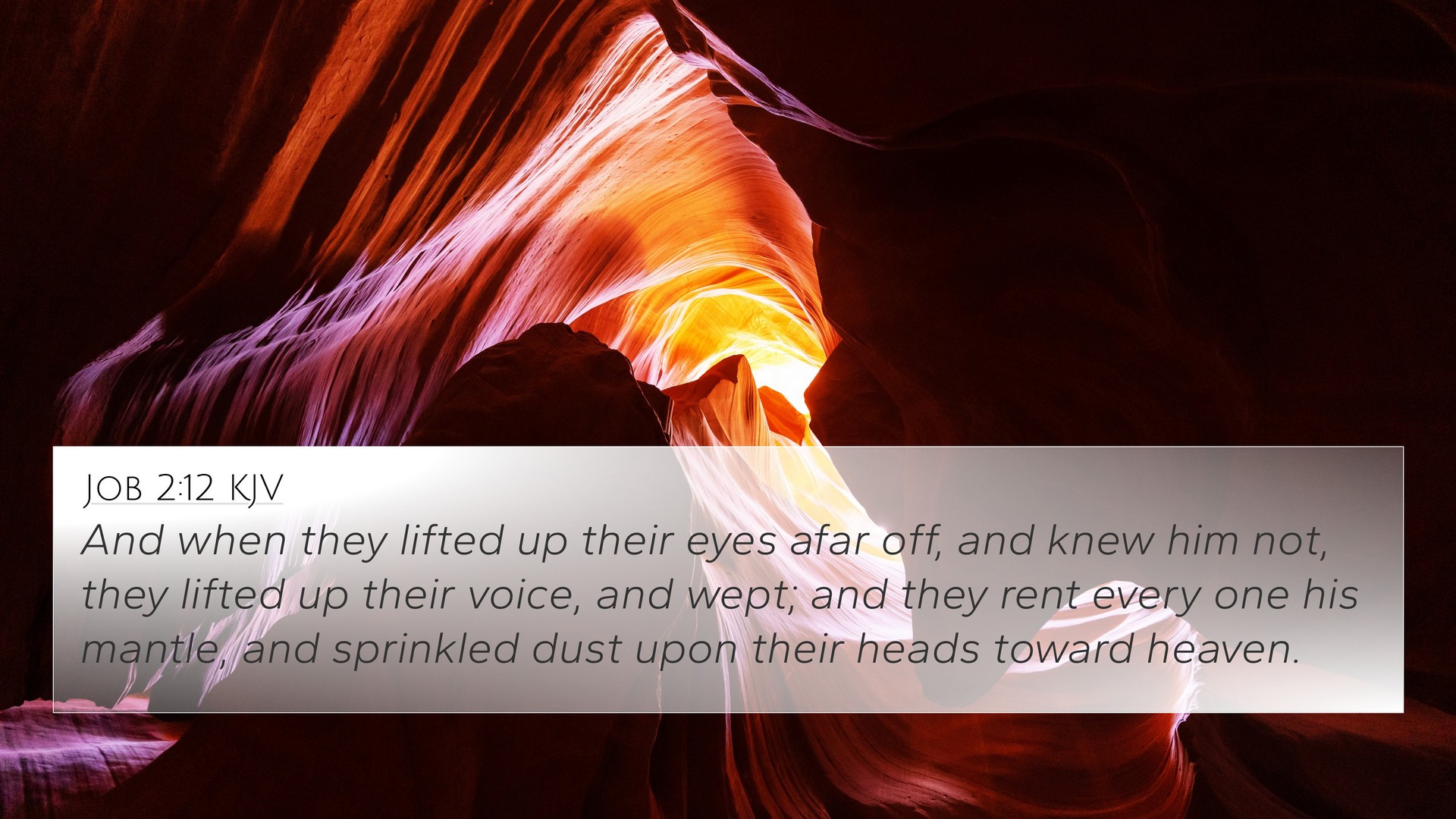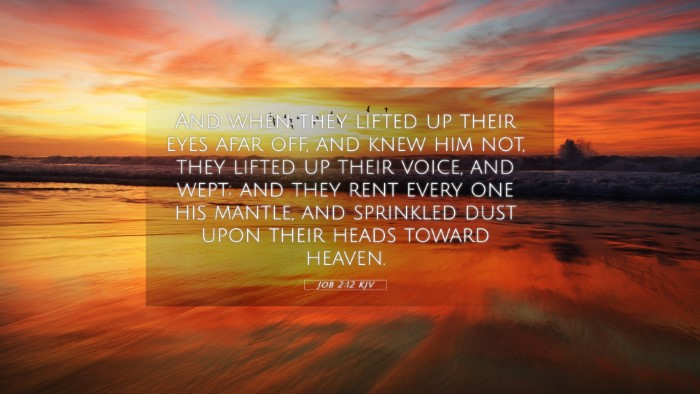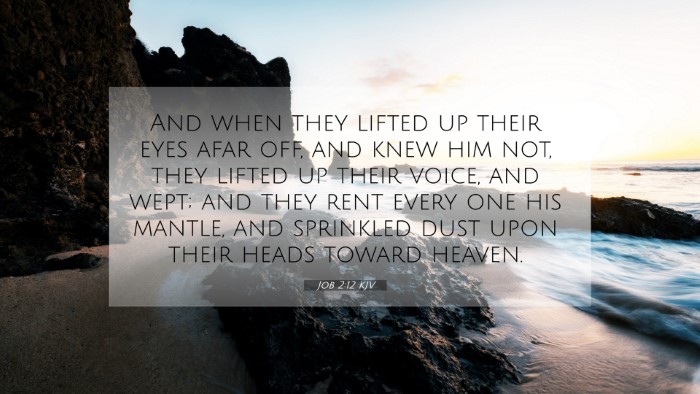Old Testament
Genesis Exodus Leviticus Numbers Deuteronomy Joshua Judges Ruth 1 Samuel 2 Samuel 1 Kings 2 Kings 1 Chronicles 2 Chronicles Ezra Nehemiah Esther Job Psalms Proverbs Ecclesiastes Song of Solomon Isaiah Jeremiah Lamentations Ezekiel Daniel Hosea Joel Amos Obadiah Jonah Micah Nahum Habakkuk Zephaniah Haggai Zechariah MalachiJob 2:12 Similar Verses
Job 2:12 Cross References
And when they lifted up their eyes afar off, and knew him not, they lifted up their voice, and wept; and they rent every one his mantle, and sprinkled dust upon their heads toward heaven.
Uncover the Rich Themes and Topics of This Bible Verse
Listed below are the Bible themes associated with Job 2:12. We invite you to explore each theme to gain deeper insights into the Scriptures.
Job 2:12 Cross Reference Verses
This section features a detailed cross-reference designed to enrich your understanding of the Scriptures. Below, you will find carefully selected verses that echo the themes and teachings related to Job 2:12 KJV. Click on any image to explore detailed analyses of related Bible verses and uncover deeper theological insights.
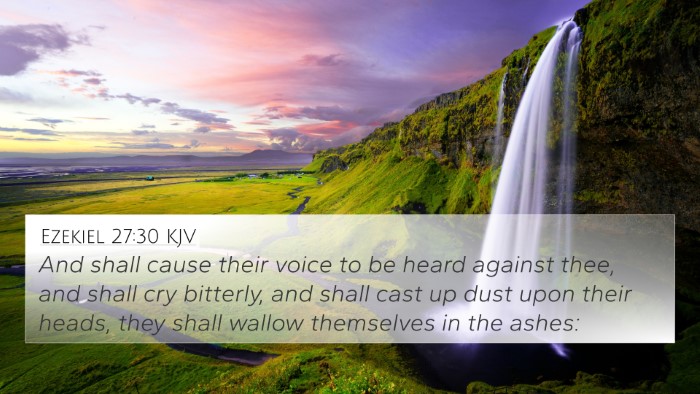
Ezekiel 27:30 (KJV) »
And shall cause their voice to be heard against thee, and shall cry bitterly, and shall cast up dust upon their heads, they shall wallow themselves in the ashes:
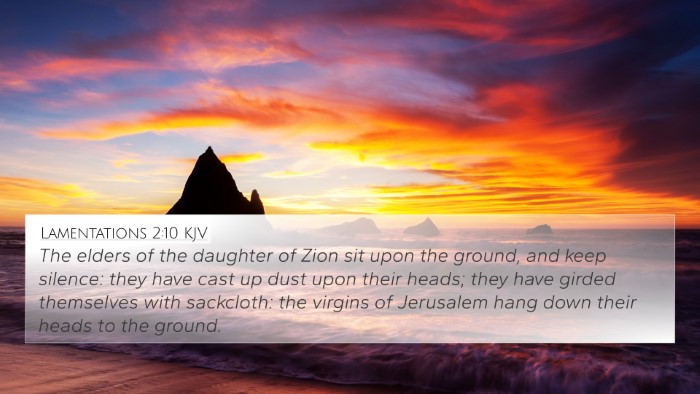
Lamentations 2:10 (KJV) »
The elders of the daughter of Zion sit upon the ground, and keep silence: they have cast up dust upon their heads; they have girded themselves with sackcloth: the virgins of Jerusalem hang down their heads to the ground.
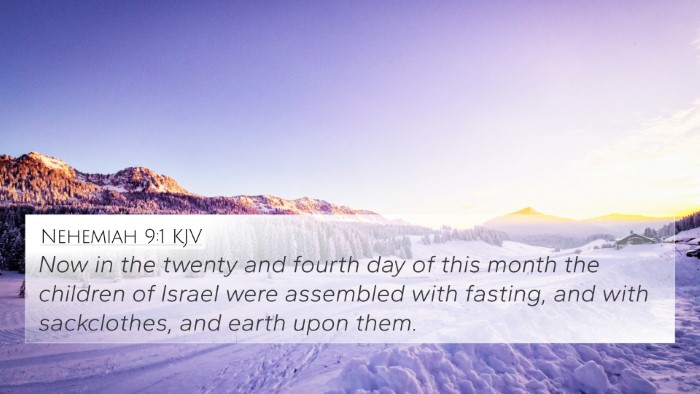
Nehemiah 9:1 (KJV) »
Now in the twenty and fourth day of this month the children of Israel were assembled with fasting, and with sackclothes, and earth upon them.

Joshua 7:6 (KJV) »
And Joshua rent his clothes, and fell to the earth upon his face before the ark of the LORD until the eventide, he and the elders of Israel, and put dust upon their heads.

Job 1:20 (KJV) »
Then Job arose, and rent his mantle, and shaved his head, and fell down upon the ground, and worshipped,
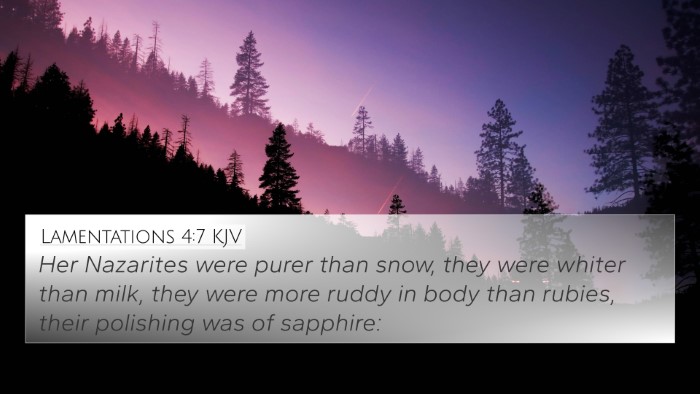
Lamentations 4:7 (KJV) »
Her Nazarites were purer than snow, they were whiter than milk, they were more ruddy in body than rubies, their polishing was of sapphire:

Esther 4:1 (KJV) »
When Mordecai perceived all that was done, Mordecai rent his clothes, and put on sackcloth with ashes, and went out into the midst of the city, and cried with a loud and a bitter cry;
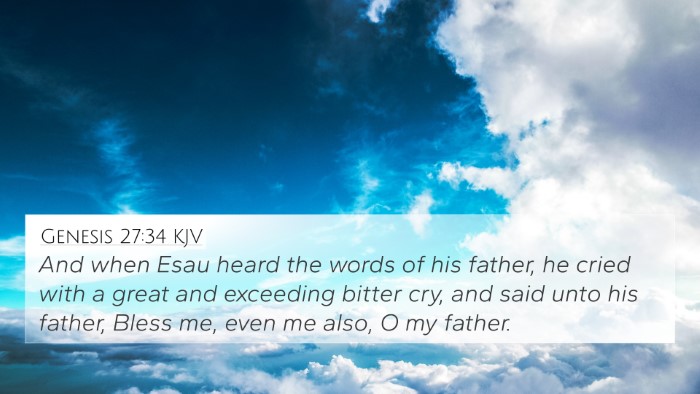
Genesis 27:34 (KJV) »
And when Esau heard the words of his father, he cried with a great and exceeding bitter cry, and said unto his father, Bless me, even me also, O my father.
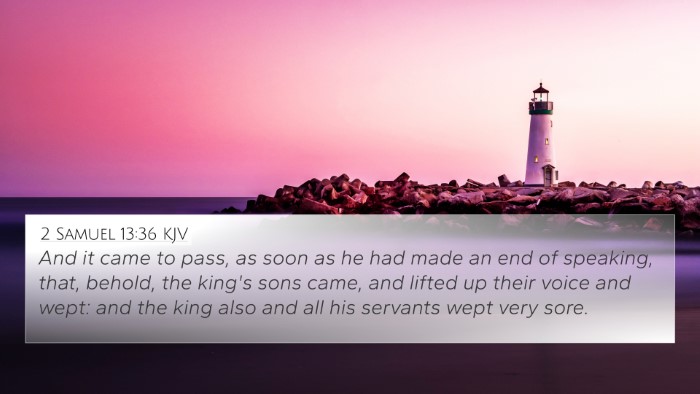
2 Samuel 13:36 (KJV) »
And it came to pass, as soon as he had made an end of speaking, that, behold, the king's sons came, and lifted up their voice and wept: and the king also and all his servants wept very sore.
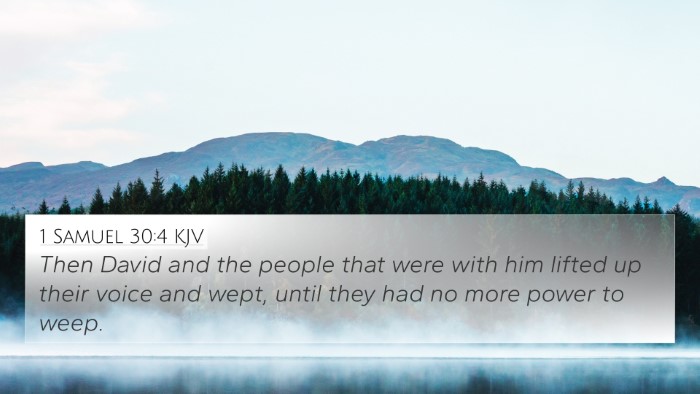
1 Samuel 30:4 (KJV) »
Then David and the people that were with him lifted up their voice and wept, until they had no more power to weep.
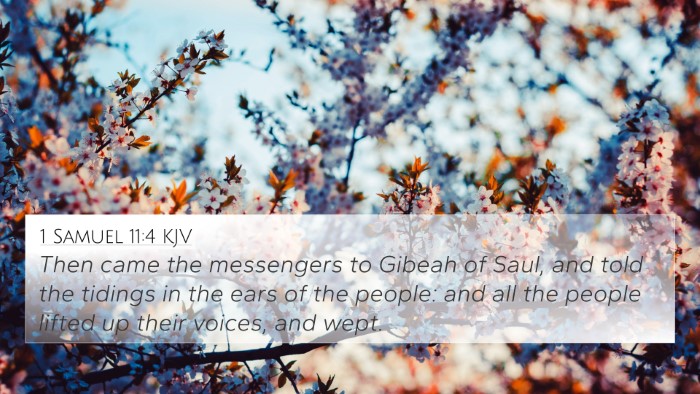
1 Samuel 11:4 (KJV) »
Then came the messengers to Gibeah of Saul, and told the tidings in the ears of the people: and all the people lifted up their voices, and wept.
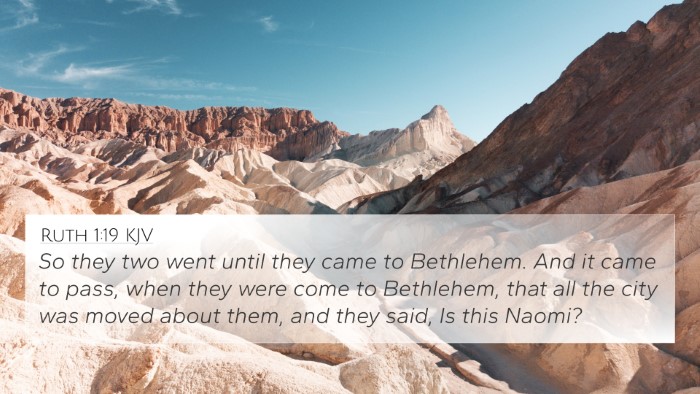
Ruth 1:19 (KJV) »
So they two went until they came to Bethlehem. And it came to pass, when they were come to Bethlehem, that all the city was moved about them, and they said, Is this Naomi?
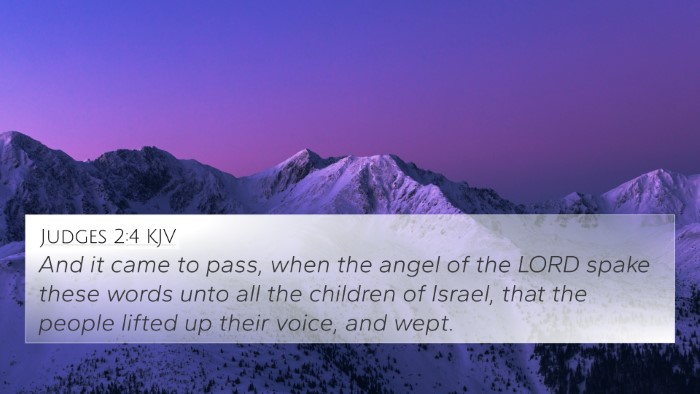
Judges 2:4 (KJV) »
And it came to pass, when the angel of the LORD spake these words unto all the children of Israel, that the people lifted up their voice, and wept.
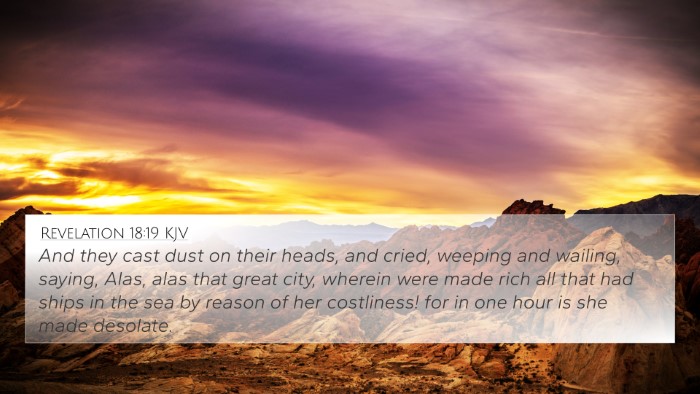
Revelation 18:19 (KJV) »
And they cast dust on their heads, and cried, weeping and wailing, saying, Alas, alas that great city, wherein were made rich all that had ships in the sea by reason of her costliness! for in one hour is she made desolate.
Job 2:12 Verse Analysis and Similar Verses
Understanding Job 2:12
Job 2:12 captures a poignant moment in the narrative where Job's friends arrive to comfort him after he has lost everything. This verse reveals their immediate reaction upon seeing his suffering. The profound impact of this moment serves as a foundation for understanding the themes of suffering, companionship, and the quest for answers in the face of adversity.
Verse Context and Overview
In Job 2:12, we read the following:
“And when they lifted up their eyes afar off, and knew him not, they lifted up their voice and wept; and they rent every one his mantle, and sprinkled dust upon their heads toward heaven.” (Job 2:12, KJV)
Summary of the Verse
This verse illustrates the deep sorrow experienced by Job’s friends as they encounter him in his state of despair. Their inability to recognize him signifies the extent of his suffering and transformation. They express their grief through weeping and traditional signs of mourning such as rending their garments and sprinkling dust, which reflects their solidarity in Job’s affliction.
Commentary Insights
Matthew Henry's Commentary
Matthew Henry emphasizes the unity and compassion demonstrated by Job's friends. He notes that their shared mourning signifies their genuine affection for Job, despite their forthcoming criticisms. Henry points out that their initial silence (not speaking) reflects the weight of grief, indicating a moment of deep respect before they later engage in dialogue.
Albert Barnes' Notes
Albert Barnes expounds on the physical actions of Job’s friends, noting that their mourning was sincere and immediate. He highlights the traditional customs of mourning during that time, suggesting that this chapter sets the stage for the conversations of pain and theology that follow in the book. Barnes points out the stark visual of Job’s transformation, aligning it with God’s sovereignty and the mysterious nature of suffering.
Adam Clarke's Commentary
Adam Clarke reminds readers that the reactions of Job’s friends reveal a universal truth about human empathy. He discusses the significance of mourning attire and the rituals associated with grief. Clarke also suggests that their actions motivate readers to reflect on the nature of friendship and support during trials.
Thematic Analysis of Job 2:12
The themes present in Job 2:12 can be analyzed through various lenses:
- Suffering: Job’s physical and emotional suffering stands central, displaying the depth of human agony.
- Empathy: The instinctive responses of Job’s friends highlight the importance of sharing burdens during times of distress.
- Tradition: Examination of mourning practices offers insights into the cultural context of the period.
- Friendship: This moment emphasizes the nature of true friends and their reactions in times of crisis.
- God’s Sovereignty: The circumstances prompting their arrival raise questions about divine providence and human suffering.
Cross-References of Job 2:12
Several Bible verses relate to Job 2:12 and help enrich the understanding of its themes:
- Psalm 34:18: “The Lord is near to the brokenhearted and saves the crushed in spirit.”
- Ecclesiastes 3:4: “A time to weep, and a time to laugh; a time to mourn, and a time to dance.”
- John 11:35: “Jesus wept.” (An example of sorrow and compassion.)
- 2 Corinthians 1:4: “Who comforts us in all our affliction, so that we may be able to comfort those who are in any affliction.”
- Romans 12:15: “Rejoice with those who rejoice, weep with those who weep.”
- Proverbs 17:17: “A friend loves at all times, and a brother is born for adversity.”
- Galatians 6:2: “Bear one another's burdens, and so fulfill the law of Christ.”
Practical Application and Reflection
Job 2:12 provides a powerful reflection point on how we respond to suffering—our own and that of others. Here are practical applications based on the verse and commentaries:
- Compassion: Strive to show genuine empathy to those in distress, offering your presence over mere words.
- Active Support: Engage in comforting rituals that validate the experiences of others in grieving.
- Reflection on Suffering: Contemplate the nature of suffering and its role in spiritual formation.
- Community Involvement: Foster communal bonds that encourage sharing burdens and mutual support.
Conclusion
Job 2:12 serves as a profound reminder of the human experience of suffering and the importance of empathy among friends. Through exploring this verse with the assistance of public domain commentaries, we gain a deeper appreciation for the complexities of grief and the valuable role of companionship during life's trials. By engaging in thematic Bible verse connections, we can enhance our understanding of Scripture and its relevance to our lives, fostering a greater sense of connection within the Christian community.
